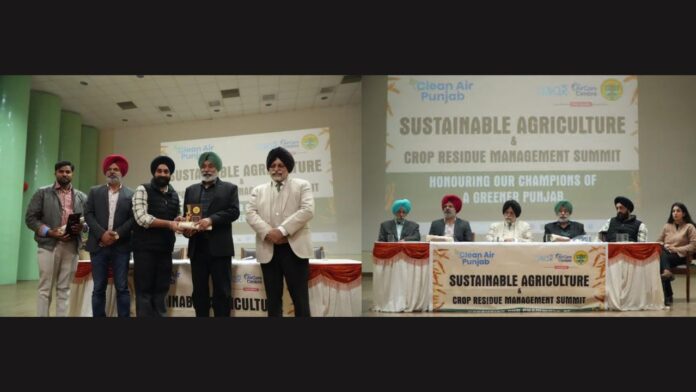Ludhiana, 20 December 2024
Clean Air Punjab, in collaboration with Punjab Agricultural University (PAU), organized an award ceremony to honor farmers from 30 villages that achieved zero stubble burning this year. Additionally, farmers from other villages across Punjab, who refrained from burning stubble, were also recognized. This milestone highlights the dedication of these farmers to sustainable agricultural practices and showcases the impact of Clean Air Punjab’s consistent grassroots engagement and collaboration with local communities through initiatives like the Krishi Vigyan Kendra network. In a pilot covering 14,000 hectares of farmland, Clean Air Punjab successfully managed to save 12,000 hectares from stubble burning, protecting soil health and reducing air pollution.
Through a mix of awareness campaigns, technical support, and farmer empowerment initiatives, Clean Air Punjab has effectively reduced fire counts across the sregion. This achievement not only marks a step forward in addressing Punjab’s air quality crisis but also sets a precedent for sustainable farming practices statewide.
The event was attended by key dignitaries from the Punjab Agricultural University, who commended the farmers for their leadership in adopting zero-burning practices.
Vice-Chancellor of Punjab Agricultural University, Dr. Satbir Singh Gosal, stated: “This ceremony highlights the positive outcomes of collaboration between academic institutions, farmer communities, and organizations like Clean Air Punjab. PAU is proud to support sustainable agriculture initiatives that improve air quality, preserve soil fertility, and benefit farmers’ livelihoods. Let this success inspire others to take similar action for a cleaner, greener Punjab.”
Professor Makhan Singh Bhullar, Director of Extension Studies at PAU, highlighted the collective efforts behind the success: “The transformation we see today is the result of relentless engagement and the willingness of farmers to embrace change. This collaboration proves that sustainable practices are not only feasible but also beneficial for the environment, agriculture, and society as a whole. These farmers are not just awardees—they are pioneers of a movement for a cleaner Punjab.”
Speaking at the event, State Climate Head, Asar, Sanam Sutirath Wazir, stated: “The strides we have made in reducing stubble burning are evidence of what can be achieved through collaboration and farmer empowerment. The commitment of these farmers has not only reduced fire counts but also improved soil health and air quality. This is a model for the rest of the country to follow. Clean Air Punjab will continue to support farmers with resources, training, and technological assistance to help them transition to sustainable practices.”
A progressive farmer, Bhalinder Singh from Sainserwal village in Patiala shared his experience: “Choosing not to burn stubble was not an easy decision at first, but with the guidance and support from Clean Air Punjab and PAU, I was able to adopt sustainable methods. Today, I see better soil health, reduced input costs, and cleaner air for my family and community. This award is a recognition of our collective efforts as farmers.”
This event underscores the importance of collaboration between institutions, policymakers, and farming communities to address critical environmental challenges. Clean Air Punjab remains committed to scaling up its efforts to ensure more villages adopt zero stubble-burning practices in the years to come.

 हिंदी
हिंदी






